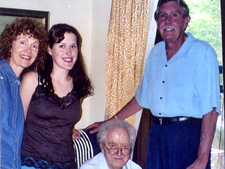Lincoln Hall Project

Carolyn Sharp Kelley (AB ’71, English education; AM ’72, teaching of English) compares her experience as a student protester during the Vietnam War era to that of her father, who attended the U of I in the 1930s.
I came back to U of I with wire-rim glasses and wearing bell bottoms and I stayed in the sorority house, but my junior year was when [Kent] State happened, when those kids, kids my age, were killed right there on campus. And it was also, a couple weeks later, when Dow Chemical came to Chambana to recruit. And some of us boycotted our Lincoln Hall classes and we marched in protest, and it, yes, did affect our grade, but looking back on it, I think it was well worth it and I’m proud that I did that.
So my experience was a far cry from my father’s. He grew up on a farm in Orion, Ill. And he lived and cooked in a tiny little apartment, sent his laundry home to save money. Participated in no extracurriculars, all focused on his studies. My dad became an IRS conferee and, before that, was captain in the army and ordered actually the first shot fired in Okinawa. He spoke so fondly of his time at U of I. And when he was courting my mother the most special thing that he could do—and I found letters that showed it happened two or three times—was coming down to Champaign from Chicago to impress her with a U of I football game, so....
I think the first two years was like high school. Yes, you wanted to get the good grades, and I was very focused on that, but the freedom, you know, going out and partying and having that rush experience and getting into the sorority of your dreams. All of that just changed so dramatically because of the politics of the country. And what had been do-or-die important suddenly became frivolous. I stayed in my sorority. A lot of kids didn’t and the Greek system kind of suffered. But we changed our focus, and we felt we had to support those of us who weren’t lucky enough and wound up over in Vietnam. And we felt that we owed them something. And the least we could do was to organize protests and to show the powers that be that we cared about this country and that we were going to question authority. Sometimes it got ugly. The Dow Chemical protest was about as ugly as it got. And it was a pretty hairy night there. I remember one of my sorority sisters actually went into labor, she was pregnant, couldn’t get to the hospital, had to have a police escort because they had closed the streets off, and that was May of 1970. So, yes we were political, and we were proud of it. But I think, you know, after all, we’re Fighting Illini. We can’t just be passive and say we don’t care about such things. So as I said it was a big, it was a sea change. But I was proud of that generation, and very proud to be a part of it.

(Length: 2:59)